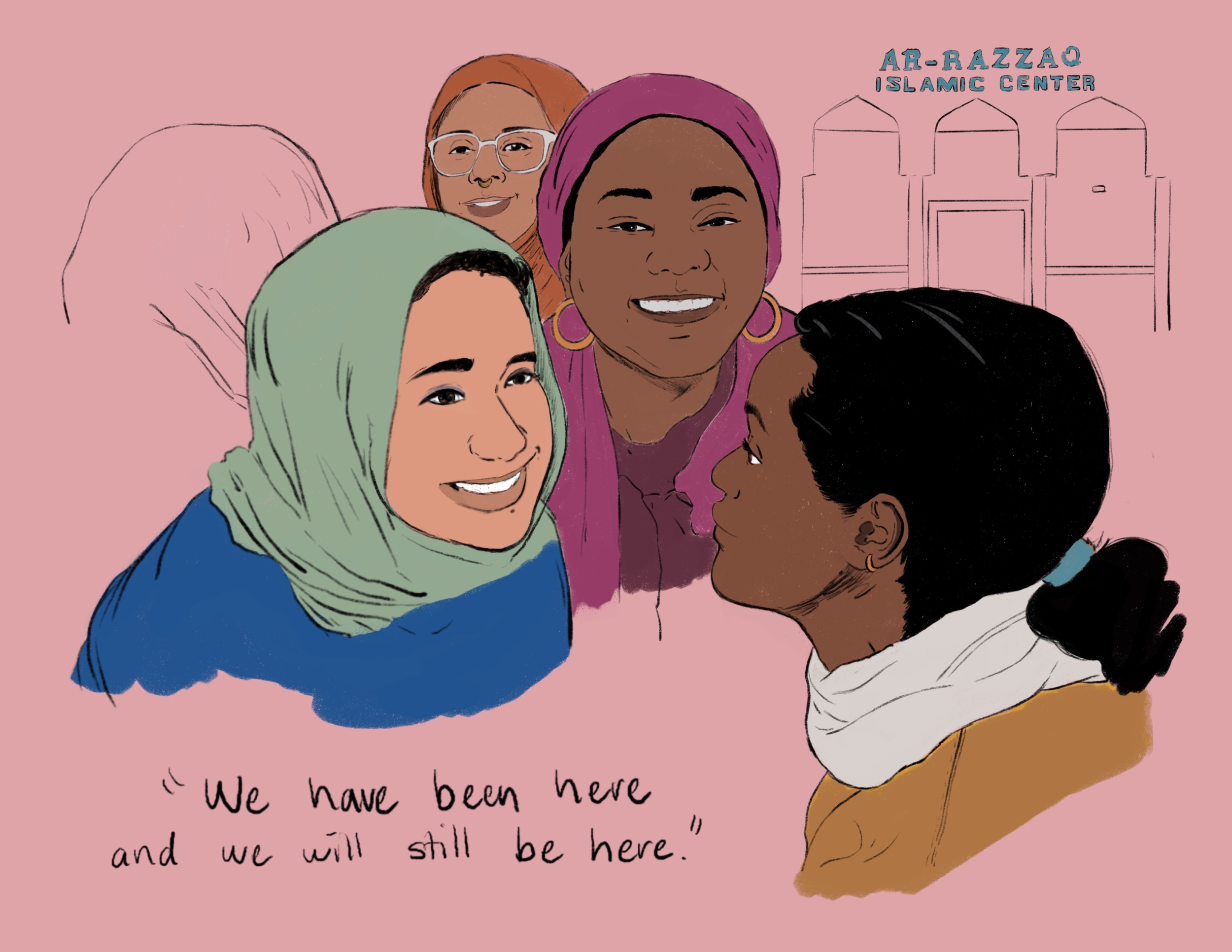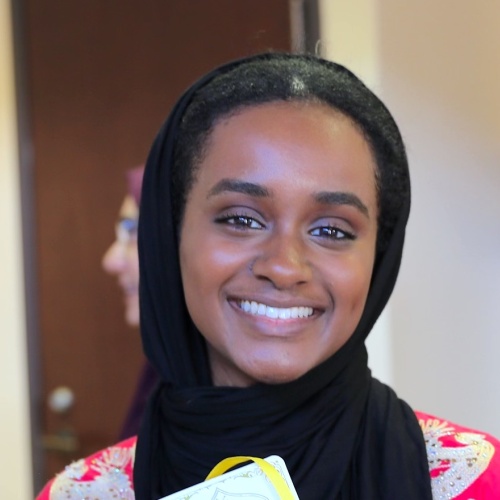Been here, still here

(Illustration: Wutang McDougal)
 This essay is the fifth in our CAROLINADAZE series, a joint project with Common Cause North Carolina featuring the voices of young North Carolinians and their visions for a better future for NC and the South.
This essay is the fifth in our CAROLINADAZE series, a joint project with Common Cause North Carolina featuring the voices of young North Carolinians and their visions for a better future for NC and the South.
“Verily, the steadfast shall have their reward without measure” (Qur’an 39:11)
My fingertips press against the building’s stucco exterior, a rough and textured cream facade. I look toward the maroon wooden doors to my left, and I place my hand on the building as if searching for its heartbeat.
The words “Ar-Razzaq Islamic Center” protrude above me — three-dimensional letters with a shade of thick forest green. The color complements the North Carolina landscape; perhaps it’s the obvious choice for a mosque, given childhood stories that insisted that the Prophet Muhamad (peace be upon him) — the last messenger of God in the Islamic tradition—loved green.
Inside the mosque, a woman wears a colorfully patterned hijab wrapped in a turban style. She welcomes me into the prayer area and urges me to find space to sit.
I was 22 years old at the time, but if I had closed my eyes at that moment, I could’ve convinced myself that Sister Beatrice Muhammad’s hug was my own grandmother’s, safely embracing me in her warmth. I am told that as an eager-eyed child, I loved being in the presence of elders. This sense of connection to ancestry was reinforced in that moment. Staunch and steadfast. I became housed in her wisdom and faith, the heart of the mosque.
I found Ar-Razzaq because of the visionary “Ambassadorial Tour” program created by Imam Abdul Hafeez Waheed, former imam at Ar-Razzaq and Duke University’s first Muslim chaplain. Imam Waheed developed the tour to educate students on the stories of Muslims in North Carolina by visiting local community centers. The tour uncovered histories that are excluded from public discourse, making its way through as many of the Muslim-led organizations and 17 mosques in the Triangle as possible.
Each stop illuminated a different chapter of Muslim communities in North Carolina. At As-Salaam Islamic Center, we talked about leaders such as Malcom X, Muhammad Ali, and Warith Deen Mohammed journeying through the state at the height of the civil rights movement. At Duke’s Center for Muslim Life, we discussed key historical figures like Omar ibn Said, a Muslim scholar from Futa Toro in West Africa who was enslaved in the Carolinas in the early 19th century. Omar was one of among the 10-50% of enslaved Africans brought to the U.S. who were Muslim (in other words, some of the first Muslims to reach the North American continent were enslaved people.) At the University of North Carolina-Chapel Hill, we learned about the history of the campus Muslim Student Association.
The tour ended with a visit to the historic Ar-Razzaq Islamic Center. Established in Durham, North Carolina in 1958, Ar-Razzaq is the first and oldest mosque in the state. Initially called Muhammad’s Mosque #34, the space became a hub for the civil and human rights movements of the 1960’s and 1970’s that inspired a social awakening across the state, mobilizing Muslim communities in Raleigh, Fayetteville, Wilmington, Kinston, and Greenville. Later, when renovated and renamed, Ar-Razzaq revitalized the West End neighborhood of Durham with educational and economic opportunities through the creation of a school, summer camps, and mutual aid and service programs. It became the heartbeat of a community.
At Ar-Razzaq, I developed a groundedness in the history of my faith that I never had before. The idea that Muslims have been in the U.S. — specifically the Carolinas — as early as the 17th century, with our presence shaping the political messiness of Southern progressive cities like Durham, still surprises those who are unfamiliar with the history of Muslims in America. In fact, I hear these refrains often: “Where are you really from? How long have you been here? Your English sounds great!” Muslims have long been involuntarily trapped in a chaotic, discursive entanglement that forces us to constantly prove our Americanness by distancing ourselves from our faith. Meanwhile, political, media, and academic institutions reinforce narratives that obfuscate the persecution of our communities and render our faith and people as inherently evil, violent, foreign, exotic, and un-American.
I personally encountered this rhetorical mess early on in my collegiate career. The Duke College Republicans, Duke Political Union, and Young Americans for Liberty held an event entitled, “The American Muslim Identity: Patriot or Insurgent.” Many students expressed outrage against the program, calling out the racist and dangerous dichotomous framing the event perpetuated. It made clear that some students could only fathom two realms of possibility for who Muslims could be: obsessively and loudly loving America, or wanting to destroy it.
By their mere existence, Ar-Razzaq and Imam Waheed contest these problematic narratives. The name itself, “Ar-Razzaq,” is Arabic for “the Provider,” and conveys one of the 99 names assigned to God in the Qur’an. It’s an apt description of the role that the institution continues to play in North Carolina’s socio-economic fabric. Meanwhile, through Imam Waheed’s educational efforts, students across North Carolina become part of a legacy of Muslims in America that rejects our community’s alienation and persecution. Like the decades of service Ar-Razzaq provided for the Durham community, Imam Waheed nurtured Muslim student life at predominantly white institutions and used history to drive social and narrative change.
In other words, here in North Carolina, I became an heir to an ecosystem of institutions and activists that envisioned a new kind of South. From the North Carolina Muslim communities, I developed a steadfast commitment to persevere, driven by preserving our own stories and legacies. Through narrative change, archival work, and storytelling, I saw our local leaders reinforce that Muslim history is American history and vice versa.
“Where are you from?” My answer: We’ve been here.
…
“Allah does not burden a soul beyond that it can bear” (Qur’an 2:286)
Across the street from Ar-Razzaq, another unpresuming, standalone building juts out of a small parking lot. I walk into Al-Taiba Market and onto a black-and-white checkered floor. I am immediately greeted by an amalgam of sugary, savory and metallic aromas delivered by the shelves lined with sweets, nuts and spices and the freshly cut halal meats packed in a gleaming glass counter.
The store’s owner, an elderly Palestinian man, greets everyone from behind the cash register with a nod. “As salaam wa alaikum.” I look at him with a smile and respond, “Wa alaikum as salaam amo.”* This yin and yang exchange, the standard call and response greeting in Islam, is like a key that immediately transforms the market into a place of nostalgia and security—into a home.
At Al-Taiba Market, we talk politics and commiserate over shared struggles. Each time I walk in, I’m reminded of Carl Degler’s analogy of the “salad-bowl” America, with North Carolinians from a diverse mix of racial and ethnic backgrounds roaming the aisles. The store owner estimates that only 25% of Al-Taiba customers understand Arabic. I happen to be one of them.
My family immigrated from Sudan over 25 years ago. In 2019, the country, nicknamed the breadbasket of Africa, revolted against a 30-year dictatorship. Hundreds of thousands of protestors mobilized on the streets, committed to building a democracy. The Sudanese Revolution promised a vision of collective liberation that my parents’ generation had given up on years ago.
Now, in 2024, we bear witness to a hellish descent into a war between the Sudanese Armed Forces (SAF) and a genocidal foreign-backed militia called the Rapid Support Forces (RSF). Many Sudanese people predicted this devolution, but the international system catalyzed it by being too ignorant, too complicit or too unwilling to act. I often ask myself if it’s the media invisibility or the manufactured “norm” of Black death in Sudan — now the world’s worst humanitarian crisis — that buys people’s silence.
In my moments of desperation, I turn to grassroots solidarities unique to Southern organizing that I find in places like Al-Taiba. With its Palestinian store owner and customers from across the Global South, it’s one of a few places where I find a shared understanding that our struggles are intertwined. And it’s one of the few places where I am released from the politics of appeal that flatten our communities into terrorists or victims or force us to become patriots as a prerequisite to receiving sympathy and solidarity.
Al-Taiba’s owner shares a history, parts of which most Palestinians are used to repeating: generations of displacement endured since 1948, his migration to America, and (this part is his own) the process of buying the market in Durham, coincidentally from a Sudanese family. Since October 2023, he has born witness to the worst cruelties of humanity, a genocide of his people that is an extention of decades of terrorism, massacres, and land theft at the hands of the Israeli military. As Palestinian writer Mohammed El-Kurd describes, “There is no need for such contextualization in Arabic: The Nakba breathes down our necks, invading our national identity and contorting our earliest encounters with our sense of self. It is relentless. It happens in the present tense, everywhere on the map.”
In the American South, community relationships are inherently political. It is only through conversations with people at Al-Taiba that I can even make sense of the multiple genocides I am witnessing against my own people and others. These extensive mutual aid and relational networks are survival mechanisms to resist structural inequities codified by the state.
In fact, one of the only Muslim statewide grassroots organizations in the state was born out of organizing community relationships like the ones I developed at Al-Taiba — Muslim Women For (MWF). MWF was co-founded in 2016 by three young Muslim women — Lela Ali, Doha Medani, and Eiman Ali — while they were student organizers at North Carolina State University and Meredith College. The organization began as a partnership rooted in friendship and sisterhood.
As Ali emphasized at a MWF Art and Food Festival, “We knew our friendship was not a coincidence. We understood that we as Muslims have a duty and responsibility to reimagine safety for our people and practice justice. But what truly brought us together was our vision to build relationships and organize people.” Since its founding, MWF has been building organized grassroots power by meeting the immediate needs of Muslim communities across North Carolina and developing organizing structures to build Muslim civic power from the ballot box to legal mechanisms to legislative advocacy and more.
The bonds that the Al-Taiba community and I share are conjured by a shared consciousness of how our realities are connected, and become a form of resistance to hopelessness and defeat that organizations like MWF can harness to build power. Indeed, the relations formed at Al-Taiba and MWF are solidarities personified.
In moments of despair, it’s my Palestinian and MWF comrades that remind me, despite attempts to exterminate our peoples, even 75 years later in the case of Palestine, we're still here.
…
“Verily, with hardship comes ease” (Qur’an 94:5)
“A spiritual center in an oasis.” That’s how several community members describe the Islamic Center of Asheville, the only mosque within its one-hour radius. The humble one-story building — painted in the same Muhammadian green hues found outside Ar-Razzaq Islamic Center in Durham — blends into the forested surroundings of Asheville, North Carolina.
The Islamic Center’s leader, Imam Khaled Bashif, describes some members driving up to three hours round trip to attend weekly Friday congregational prayer, called Jumu’ah, at the mosque. It’s become a Mecca in the area, a home in the midst of mountains for the world’s most racially and ethnically diverse and fastest-growing religion.
“And the hurricane ... ?” I ask a community member.
“We’re surviving.”
Their immediate response is reassurance. They describe the various fundraisers and mutual aid efforts the mosque is providing for the community, as well as the ways organizations like Muslim Women For have reached out to help. “Because our tax money is going to the military in Israel instead of our communities here, we have to organize these things ourselves,” they say matter-of-factly.
This statement highlights a profound chasm. Instead of state systems investing in rural infrastructure or addressing the needs of working-class people on the ground, the federal government sends billions in dollars in military aid to a government entity enacting genocide on Palestinians. On the same day that the Federal Emergency Management Agency (FEMA) announced a $9 billion deficit for hurricane relief, Israel reported it had secured another $8.7 billion in military aid.
So, who do people turn to in crisis? Where does one look for security? Who will hold our legacies? In light of the failures of the state, the Islamic Center of Asheville, like many organizations in the South, are the roots that sustain the survival of our people.
Without knowledge of the community, I might not have thought to look for a Muslim community in western North Carolina. Without their storefront signs, I might have assumed the Ar Razzaq Islamic Center and Al-Taiba Halal Market were two other empty buildings on West Chapel Hill Street. Their now-faded yellow, green, and gray hues almost beg bystanders to walk past.
But these assumptions are products of the predominant understandings of the absence of Muslims, Palestinians, and Arabs from the American South.
Through narrative change, movement building, and mutual aid, Muslims are, and have long been, part of the fabric of the ecosystem of social change in the U.S. It’s through the histories of Omar ibn Said and Ar-Razzaq, mentors like Imam Waheed, cornerstones like Al-Taiba and the Islamic Center of Asheville, and organizations like Muslim Women For that we see ethics of community and resilience become embodied.
In the spirit of the Qur’an, Imam Khaled reminds the community, “Verily with hardship, comes ease.”
We have been here and we will still be here.

This article first appeared in the Carolina Daze Essay Series. Find more articles here.
The CAROLINADAZE Essay Series is a project of Common Cause North Carolina in partnership with Facing South. To learn more and stay in touch, please visit carolinadaze.com and sign up for Common Cause NC's newsletter. Common Cause NC is a nonpartisan grassroots organization dedicated to upholding the core values of American democracy. Learn more at www.commoncause.org/north-
Tags
Hadeel Hamoud
Hadeel Hamoud is an organizer, advocate, and life-long student of movements for liberation. Graduating from Duke University studying International Comparative Studies and Political Science, Hadeel has conducted research on the impacts of COVID-19 on migrant populations in the Middle East and North Africa, environmental peacebuilding, and on assessing the needs of Durham’s immigrant youth population. She is currently the Triangle Organizer at Muslim Women For and an Executive Assistant at Pillars Fund. She is based in Brooklyn, New York but calls North Carolina and Maryland home.
